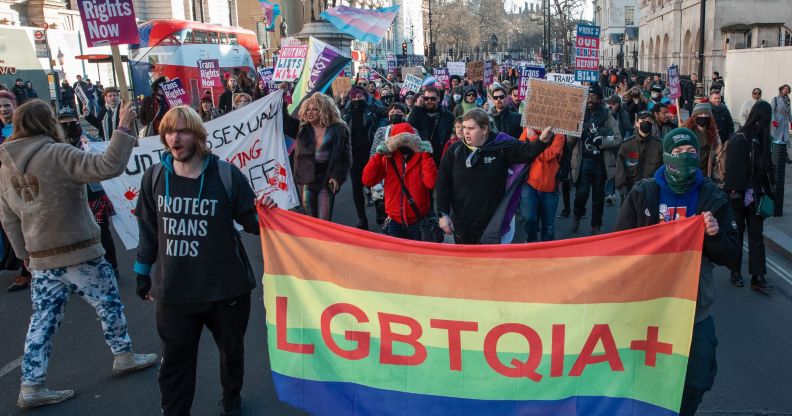LGBTQ+ Scots ‘don’t realise their rights are being breached’ – but Human Rights Bill could help

The survey could provide insight into the state of LGBTQ+ rights in Scotland. (Getty)
As the Scottish government prepares to introduce a draft Human Rights Bill, LGBTQ+ people are being encouraged to share their experiences.
Holyrood opened a consultation in June to inform its landmark legislation, which aims to “incorporate a range of economic, social and cultural rights into Scots law for the first time, as far as possible within the limits of devolved competence”.
Equality Network, an LGBTQ+ rights organisation based in Edinburgh, opened its own survey on Tuesday (8 August) to “make sure that LGBTI+ voices are heard” and to inform its own response to the consultation.
Equality Network policy manager, Rebecca Crowther, told PinkNews that many Scots don’t even realise the ways their rights are being infringed.
“A lot of people maybe don’t realise what their human rights are and that they are being breached in some instances,” she said. “We’re going to take that data and try to understand how people are experiencing life and therefore how they are having their human rights breached.
“A lot of people assume that we have everything we need and that the LGBT community is very well served and everything’s fine, but when you break it down there are a lot of people really suffering because of their lack of access to health care, because of inadequate housing.
“There are also some questions in there which we hope will particularly target people who have maybe sought asylum in Scotland due to being LGBT.”
She noted broadly pivotal issues such as health care access for trans and non-binary people and queer women, as well as the cost of living crisis as considerations for the survey.
Crowther said there was potential for the bill to help protect LGBTQ+ people, but that the consultation is “very complicated.”
“We decided that the best way for us to engage the community was for us to really kind of translate the consultation for ourselves,” she said.
‘Respect and dignity’ important for LGBTQ+ people in Scotland
A guide to the official consultation explains that the Scottish government has been advised to incorporate four international human rights treaties into Scotland law – those covering economic, social and cultural rights, disabled people’s rights, the rights of Black and ethnic minority groups, and women’s rights.
These treaties will all include considerations on equal access to rights for the elderly and LGBTQ+ people.
In a foreword, social justice cabinet secretary Shirley-Anne Somerville wrote that the bill and its considerations would become a vehicle for “transformative, positive change” for Scotland.
“By giving domestic legal effect to these standards, Scotland can ensure that focused attention on fundamental rights like health, housing and an adequate standard of living is not a political choice.
“This bill will therefore help to tackle poverty and inequality, aid the delivery of a better environment for our future generations to enjoy, deliver stronger public services and improve the lives of those who are most marginalised.”
Crowther noted to PinkNews that, to that effect, extra consideration must be made to specific societal issues that LGBTQ+ face, including institutional and domestic discrimination.
“We’re asking the Scottish government to name LGBTI+ people on the face of the bill, to have this equalities clause, to have something they’re calling the interpretive clause which will allow lawmakers and public authorities to look towards international guidance and different cases to ensure that dignity is taken into account for LGBTI+ people.
“Clearly we can see that queer people have not always been treated that way, and are still not treated with inherent worth. We’re often treated as different, we’re not afforded the same respect and dignity as others. This is a really important one for us.”
Crowther said the survey attempts to break down the fundamental treaties of the UN’s International Covenant on Economic, Social and Cultural Rights (ICESCR), which the committee is also considering, as well as an additional treaty on the right to a healthy environment and others.
“We’ve basically taken those treaties and distilled them into some pretty straightforward questions that everybody should be able to engage with.”
How did this story make you feel?

